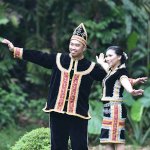Kaamatan in Sabah and Labuan Date in the current year: May 30, 2026
 Kaamatan (Pesta Kaamatan) is an annual harvest festival celebrated in parts of Malaysia on May 30 and 31 every year. Originally celebrated by the Kadazan-Dusun people, it has become one of the major national festivals of Malaysia.
Kaamatan (Pesta Kaamatan) is an annual harvest festival celebrated in parts of Malaysia on May 30 and 31 every year. Originally celebrated by the Kadazan-Dusun people, it has become one of the major national festivals of Malaysia.The Kadazan-Dusun are two indigenous ethnic groups of the Malaysian state of Sabah. They are also known as Mamasok Sabah, which means “originals (indigenous people) of Sabah”. The Kadazan-Dusun believe that their ancestors came from Nunuk Ragang, a small settlement near what is now the village of Tampias in Sabah.
The belief system of the Kadazan-Dusun is called Momolianism. It is based on the belief that the environment the Kadazan-Dusun live in consists of two worlds, the seen material world and the unseen spirit world, that are supposed to be in balance. According to Momolianism, the land was gifted to the Kadazan-Dusun by the creator, and it connects them to the past, present and future. Even after most Kadazan-Dusun converted to Christianity or Islam, the fundamental values and concepts of Momolianism have continued to play an important role in their lives.
Momolianism has been passed down from generation to generation by high priestesses called Bobohizans by the Kadazan or Bobolians by the Dusun. Bobonizans act as mediators between the people and the spirits in ancient pagan rites; one of their primary roles is to appease Bambaazon (Bambarayon), the spirit of rice paddies, during the annual harvest festival Kaamatan.
The name Kaamatan is derived from the Kazan-Dusun word tomot, which means “harvest”. The festival marks the rice-harvest period in Sabah. Back in the day, a Bobohizan would lead a procession of villagers through the paddy field under the full moon to thank the rice spirit Bambazoon for the bountiful harvest. The Bobohizan also performed special rituals to appease other spirits and deities whom humans may have hurt by their wrongful acts.
Today, Kaamatan is more of a cultural festival showcasing the cultural heritage of the Kadazan-Dusun that is celebrated not only by the Kazan-Dusun people, but also by other ethnic groups in northern Borneo. The celebration includes a state-level beauty pageant called Unduk Ngadu Kaamatan that has been held every year since 1960, a singing contest called Sugandoi, a traditional folk dance performance called Sumazau, various other performances, sports competitions and games, and more.
The annual celebration of Kaamatan is coordinated by the Kadazan Dusun Cultural Association Sabah (KDCA Sabah), an association of 40 sub-groups of the Kadazan-Dusun living in Sabah that focuses on the preservation, development, enrichment and promotion of Kazan-Dusun cultural heritage. One of the association’s main goals regarding Kaamatan is to educate the general public about the unique cultural heritage of the Kadazan-Dusun and encourage the younger generation of the Kadazan-Dusun to embrace their roots.
The celebration of Kaamatan lasts for the whole month of May, and its last two days are a public holiday in the federal territory of Labuan and the state of Sabah. Around the same time, the Dayak people in Sarawak celebrate their own cultural festival called Gawai Dayak.
- Category
- Cultural Observances
- Country
- Malaysia
- Tags
- Kaamatan, Pesta Kaamatan, cultural observances, harvest festival, holidays in Malaysia, Kadazan-Dusun